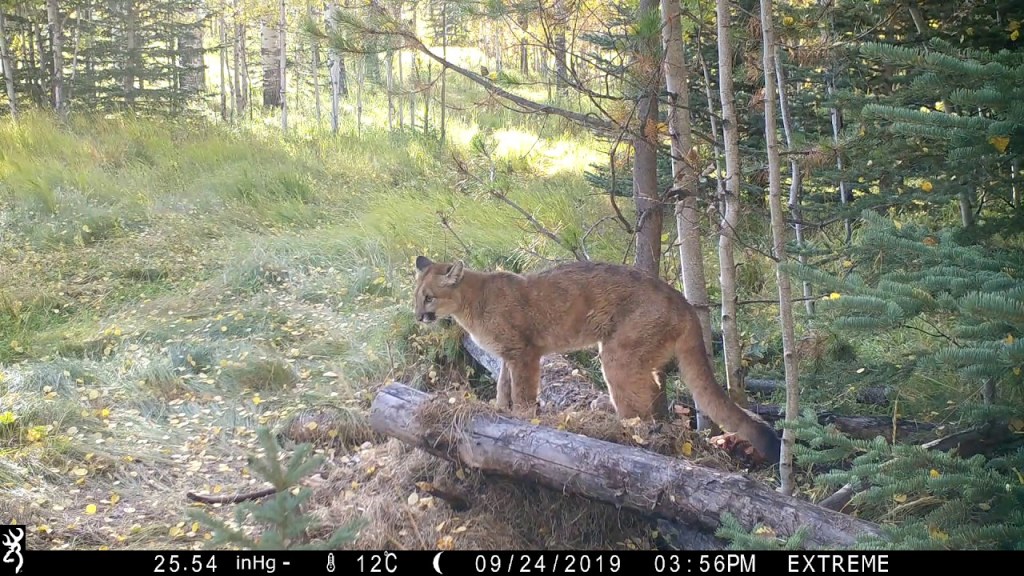Discover The Surprising Truth: Mountain Lion Sounds Like A Bird! Click Now To Hear It!
Mountain Lion Sounds Like a Bird: Unveiling the Astonishing Abilities of Nature
Introduction
Hello, Lions Enthusiast! Welcome to this exclusive article that will take you on a fascinating journey into the world of mountain lions. Brace yourself as we explore the surprising fact that mountain lions can sound like birds. Prepare to be amazed by the wonders of nature and its remarkable creatures.
1 Picture Gallery: Discover The Surprising Truth: Mountain Lion Sounds Like A Bird! Click Now To Hear It!

Mountain lions, also known as cougars, pumas, or panthers, have long been admired for their agility, strength, and stealth. However, their ability to mimic bird sounds remains a lesser-known aspect of their behavior. In this article, we will delve into the what, who, when, where, why, and how of mountain lions sounding like birds, as well as uncover the advantages and disadvantages of this unique talent. So, let’s embark on this remarkable journey together!
What Makes Mountain Lions Sound Like Birds?

Image Source: ytimg.com
Mountain lions possess a wide range of vocalizations, including roars, growls, hisses, and even purrs. However, their ability to emit bird-like sounds is truly astonishing. These feline predators have a highly flexible larynx, allowing them to produce a variety of vocalizations that resemble the melodious chirping of birds.
This mimicry is possible due to the unique structure of their vocal cords, which can produce a wide range of pitches and tones. By adjusting the tension and shape of their vocal cords, mountain lions can imitate the calls of various bird species, creating an intriguing and deceptive soundscape.
Who Benefits from This Remarkable Ability?
The ability of mountain lions to sound like birds serves multiple purposes, benefiting both the predators themselves and their prey. For the mountain lions, this vocal mimicry provides them with a camouflage advantage during hunting. By imitating bird sounds, they can deceive their prey and approach undetected, increasing their chances of a successful ambush.
On the other hand, this mimicry also benefits the prey species. Birds, which often serve as potential prey for mountain lions, may become wary upon hearing the familiar sounds and take evasive actions. This instinctive response can potentially save the lives of numerous avian creatures, reinforcing the delicate balance of the ecosystem.
When Do Mountain Lions Employ this Skill?
Mimicking bird sounds is most commonly observed during the dusk and dawn hours when visibility is lower, and birds are particularly active. By blending in with the surrounding avian chorus, mountain lions can effectively mask their presence, making it challenging for both their prey and other predators to detect them.
Furthermore, this vocal mimicry is prevalent during the mating season when mountain lions engage in courtship rituals. By imitating bird calls, they can attract potential mates and communicate their availability and intentions, adding a unique element to their complex social behavior.
Where Can One Encounter This Phenomenon?
Mountain lions are native to the Americas, from the Canadian Yukon to the southern Andes of South America. As such, their ability to sound like birds can be observed in a vast array of natural habitats, including forests, mountains, deserts, and grasslands.
However, it’s important to note that mountain lions are elusive creatures, often preferring remote and quiet areas away from human settlements. Encountering this phenomenon requires patience, respect for their space, and a deep understanding of their behavioral patterns.
Why Do Mountain Lions Engage in Vocal Mimicry?
The reasons behind mountain lions’ vocal mimicry are multifaceted. As mentioned earlier, this skill aids them in hunting by providing a disguise that can deceive their prey. By blending in with the soundscape of their surroundings, they can launch surprise attacks, increasing their chances of a successful kill.
Additionally, vocal mimicry may serve as a defense mechanism. By imitating bird calls, mountain lions can confuse potential predators, creating doubt and hesitation. This technique can buy them valuable time to escape from dangerous situations or protect their young.
How Do Mountain Lions Produce Bird-like Sounds?
The production of bird-like sounds requires a combination of anatomical adaptations and vocal techniques. Mountain lions possess a highly flexible larynx, which enables them to modify the shape and tension of their vocal cords. By doing so, they can mimic the intricate melodies and pitches of various bird species.
Furthermore, the muscles surrounding their vocal apparatus play a crucial role in sound production. Through precise control of these muscles, mountain lions can create subtle variations in their vocalizations, accurately imitating the calls of different birds.
Advantages and Disadvantages of Mountain Lions Sounding Like Birds
1. Advantage: Enhanced Hunting Abilities 🔥
By imitating bird sounds, mountain lions can effectively camouflage themselves in their environment, increasing their chances of capturing prey. This advantage allows them to maintain their position as apex predators within their ecosystems.
2. Advantage: Protection of Prey Species 😊
While birds may initially become alert upon hearing the mimicry, their instinctive response can help them avoid becoming victims. This advantage allows for the preservation of avian populations and the maintenance of a balanced ecosystem.
3. Disadvantage: Misidentification by Humans 😕
The mimicry of bird sounds by mountain lions can sometimes lead to misunderstandings or misidentification by humans. This disadvantage may result in unnecessary fear, which can negatively impact conservation efforts and the coexistence between humans and these majestic creatures.
4. Disadvantage: Potential Disruption of Bird Communication 😦
The mimicry of bird sounds by mountain lions has the potential to create confusion among the bird populations. This disadvantage may disrupt their communication systems and affect their ability to carry out essential behaviors such as mating, foraging, and warning others of potential dangers.
Frequently Asked Questions
1. Can mountain lions perfectly imitate any bird sounds?
No, while mountain lions can mimic a wide range of bird sounds, their ability to perfectly imitate specific species may vary. Their mimicry tends to encompass a general melodic pattern rather than an exact replication of a particular bird’s call.
2. Are there other animals that can mimic bird sounds?
Yes, besides mountain lions, certain species of parrots, mockingbirds, and starlings are well-known for their exceptional ability to mimic bird sounds and even human speech.
3. How far can mountain lion vocalizations travel?
Mountain lion vocalizations, including their bird-like sounds, can carry over long distances. Their calls can travel up to several miles, allowing them to communicate with other individuals within their territories.
4. Is the mimicry of bird sounds by mountain lions a learned behavior or instinctual?
The mimicry of bird sounds in mountain lions is considered to be an instinctual behavior. As young cubs grow, they gradually develop the ability to produce a wide range of vocalizations, including the mimicry of bird calls.
5. How can humans differentiate between a mountain lion and an actual bird?
When encountering bird-like sounds in the wilderness, it is crucial to remain alert and aware of your surroundings. Mountain lions often produce deeper and more resonant calls compared to actual birds. Moreover, their vocalizations lack the complexity and diversity found in the natural avian chorus.
Conclusion
In conclusion, the fact that mountain lions can sound like birds adds another layer of awe to their already impressive repertoire of skills. This remarkable ability enables them to navigate their environment with stealth and cunning, blending seamlessly into the natural soundscape while hunting or communicating with potential mates.
However, it is essential to recognize the advantages and disadvantages that come with this mimicry. While it assists mountain lions in securing their survival and maintaining a balanced ecosystem, it can also lead to misunderstandings and potential disruption of bird populations.
As nature continues to reveal its astonishing wonders, let us cherish and respect the diverse talents of our fellow beings, including the awe-inspiring ability of mountain lions to sound like birds.
Final Remarks
As we conclude this captivating exploration, it is crucial to emphasize the importance of coexistence and conservation efforts. Protecting the habitats of mountain lions and other wildlife allows us to preserve the delicate balance of ecosystems and appreciate the beauty of nature.
Remember, when venturing into mountain lion territory, always prioritize safety and abide by the guidelines set forth by wildlife authorities. By doing so, we can ensure the harmonious existence of both humans and these magnificent creatures for generations to come.
This post topic: Lions



